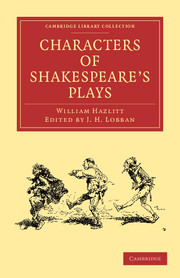Book contents
- Frontmatter
- Preface
- Contents
- Introduction
- Preface
- Cymbeline
- Macbeth
- Julius Cæsar
- Othello
- Timon of Athens
- Coriolanus
- Troilus and Cressida
- Antony and Cleopatra
- Hamlet
- The Tempest
- The Midsummer Night's Dream
- Romeo and Juliet
- Lear
- Richard II
- Henry IV
- Henry V
- Henry VI
- Richard III
- Henry VIII
- King John
- Twelfth Night; or, what you will
- The Two Gentlemen of Verona
- The Merchant of Venice
- The Winter's Tale
- All's Well That Ends Well
- Love's Labour's Lost
- Much Ado About Nothing
- As You Like It
- The Taming of the Shrew
- Measure for Measure
- The Merry Wives of Windsor
- The Comedy of Errors
- Doubtful plays of Shakespear
- Poems and Sonnets
- Notes
Othello
Published online by Cambridge University Press: 07 September 2010
- Frontmatter
- Preface
- Contents
- Introduction
- Preface
- Cymbeline
- Macbeth
- Julius Cæsar
- Othello
- Timon of Athens
- Coriolanus
- Troilus and Cressida
- Antony and Cleopatra
- Hamlet
- The Tempest
- The Midsummer Night's Dream
- Romeo and Juliet
- Lear
- Richard II
- Henry IV
- Henry V
- Henry VI
- Richard III
- Henry VIII
- King John
- Twelfth Night; or, what you will
- The Two Gentlemen of Verona
- The Merchant of Venice
- The Winter's Tale
- All's Well That Ends Well
- Love's Labour's Lost
- Much Ado About Nothing
- As You Like It
- The Taming of the Shrew
- Measure for Measure
- The Merry Wives of Windsor
- The Comedy of Errors
- Doubtful plays of Shakespear
- Poems and Sonnets
- Notes
Summary
It has been said that tragedy purifies the affections by terror and pity. That is, it substitutes imaginary sympathy for mere selfishness. It gives us a high and permanent interest, beyond ourselves, in humanity as such. It raises the great, the remote, and the possible to an equality with the real, the little and the near. It makes man a partaker with his kind. It subdues and softens the stubbornness of his will. It teaches him that there are and have been others like himself, by shewing him as in a glass what they have felt, thought, and done. It opens the chambers of the human heart. It leaves nothing indifferent to us that can affect our common nature. It excites our sensibility by exhibiting the passions wound up to the utmost pitch by the power of imagination or the temptation of circumstances; and corrects their fatal excesses in ourselves by pointing to the greater extent of sufferings and of crimes to which they have led others. Tragedy creates a balance of the affections. It makes us thoughtful spectators in the lists of life. It is the refiner of the species; a discipline of humanity. The habitual study of poetry and works of imagination is one chief part of a wellgrounded education. A taste for liberal art is necessary to complete the character of a gentleman. Science alone is hard and mechanical. It exercises the understanding upon things out of ourselves, while it leaves the affections unemployed, or engrossed with our own immediate, narrow interests.
- Type
- Chapter
- Information
- Characters of Shakespeare's Plays , pp. 40 - 53Publisher: Cambridge University PressPrint publication year: 2009First published in: 1908

